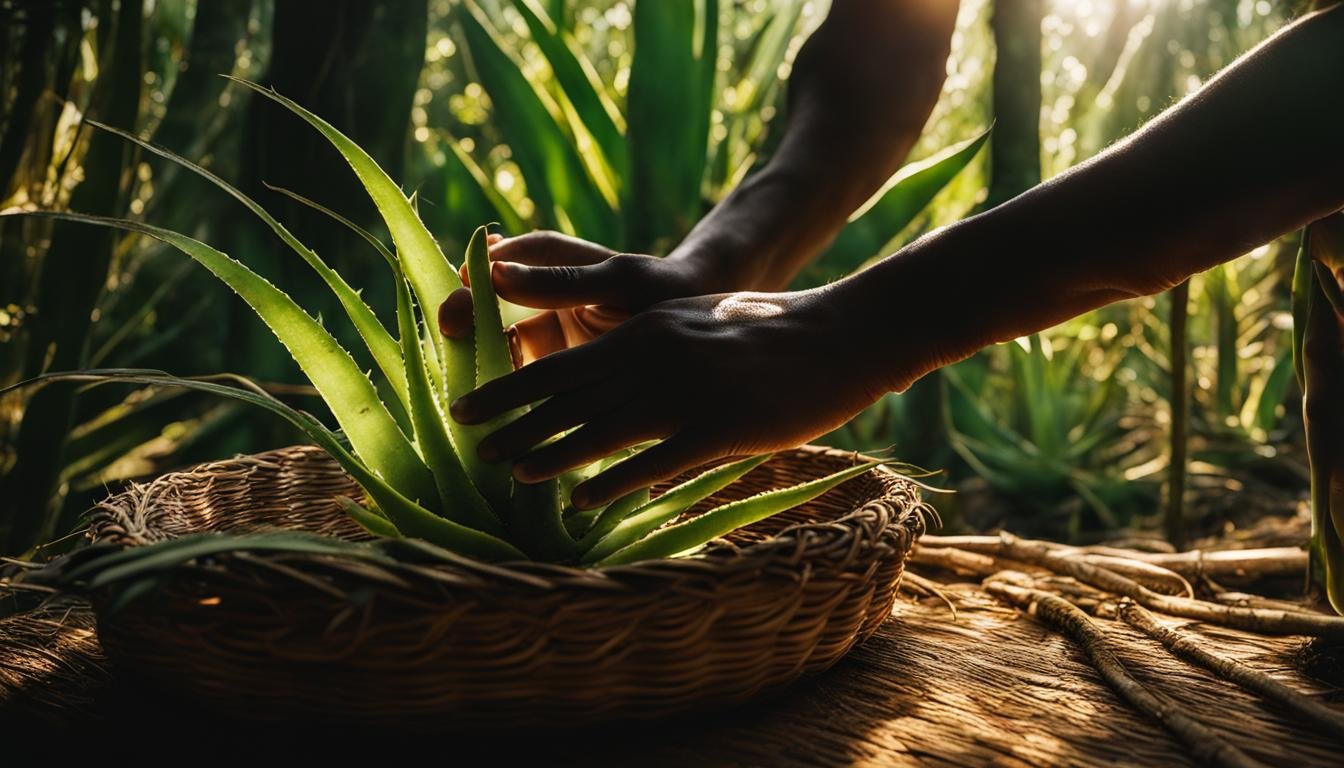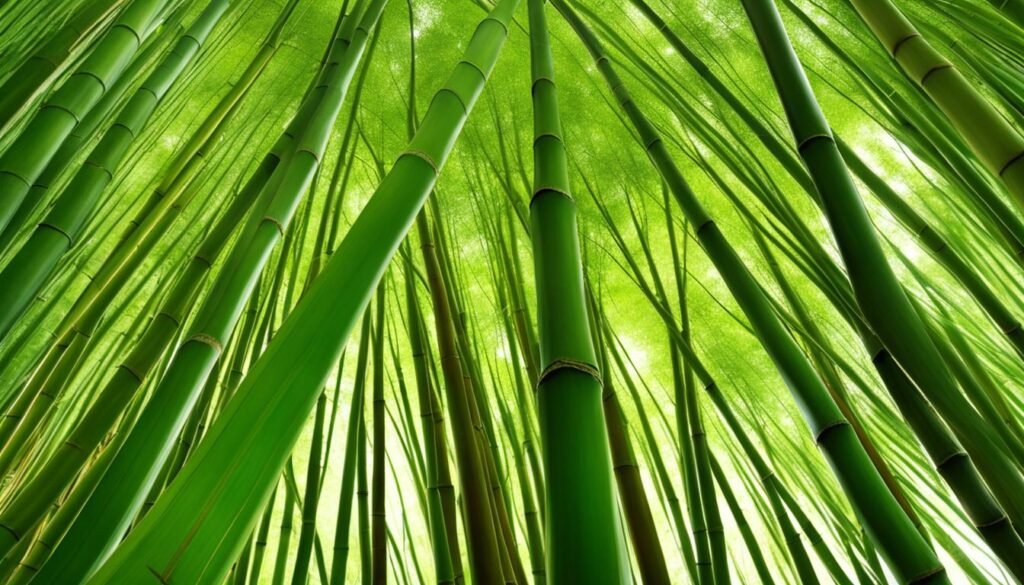Welcome to my blog, where we embark on a fascinating journey to explore the rich history and folklore surrounding aloe vera. Join me as we dive into the traditional uses, historical significance, and medicinal properties of this extraordinary plant. From ancient legends to modern practices, aloe vera has captivated cultures around the world with its remarkable healing abilities and versatile applications.
Key Takeaways:
- Aloe vera holds a significant place in folklore and has been revered for centuries.
- It has been used traditionally for various purposes, from healing wounds to warding off evil spirits.
- Ancient civilizations, such as the Egyptians and Mesopotamians, believed in the magical properties of aloe vera.
- Today, aloe vera is widely used in natural health products and alternative remedies.
- Its historical significance and medicinal properties continue to make it a popular choice for both traditional and modern practices.
Aloe Vera: A Desert Ocean-Dweller
When I think of aloe vera, I am transported back to my childhood, where the desert plants of my imagination took on an element of exoticism. Despite being commonly associated with arid environments, aloe vera is not a cactus but belongs to the Lily family. Its thick, spiny leaves grow in a rosette pattern, giving it a unique and striking appearance. When aloe vera flowers, it adds a touch of grandeur to any setting with its vibrant yellow blooms.
The characteristics of aloe vera make it seem like a hidden gem in the desert landscape. Its resilient nature allows it to thrive in harsh and dry conditions, while its gel-filled leaves store water for survival. This adaptability is a testament to the plant’s endurance and serves as a reminder of the wonders that nature has to offer.

Magic Medicine: Aloe Vera in Childhood Games
As a child, I was fascinated by the magical properties of aloe vera. My friends and I would play pretend games where we would use the gel of the aloe vera plant as “magic medicine” to heal imaginary wounds. Little did we know that our childhood games were rooted in the ancient beliefs surrounding this remarkable plant.
Ancient civilizations such as the Egyptians and Mesopotamians believed in the healing power of aloe vera and valued it as a potent remedy. In fact, aloe vera has been used for centuries for its medicinal properties, and its gel has been referred to as “magic medicine.” It’s no wonder that we were drawn to the idea of using aloe vera to heal our pretend injuries.
Ancient beliefs and traditions have a way of seeping into our collective consciousness, even in the form of childhood games. The magical healing properties associated with aloe vera made it the perfect ingredient for our imaginative play. It was a plant that could cure any ailment and bring comfort and relief, just like the ancient civilizations believed.
Table: Traditional Uses of Aloe Vera
| Traditional Use | Description |
|---|---|
| Wound Healing | Aloe vera gel is known for its soothing and healing properties, making it effective in treating cuts, burns, and other skin wounds. |
| Sunburn Relief | The cooling effects of aloe vera gel can help alleviate the discomfort and redness associated with sunburns. |
| Skin Moisturizing | Aloe vera gel is a natural moisturizer that can hydrate and nourish the skin, leaving it soft and supple. |
| Digestive Aid | Consuming aloe vera juice can help promote healthy digestion and relieve symptoms of indigestion and heartburn. |
“Aloe vera gel is known for its soothing and healing properties, making it effective in treating cuts, burns, and other skin wounds.”
While our childhood games may have been make-believe, the healing properties of aloe vera are very real. Today, aloe vera gel is widely used in skincare products, dietary supplements, and alternative remedies due to its numerous health benefits. The ancient beliefs about aloe vera as a magical medicine continue to resonate, reminding us of the enduring power and significance of this remarkable plant.
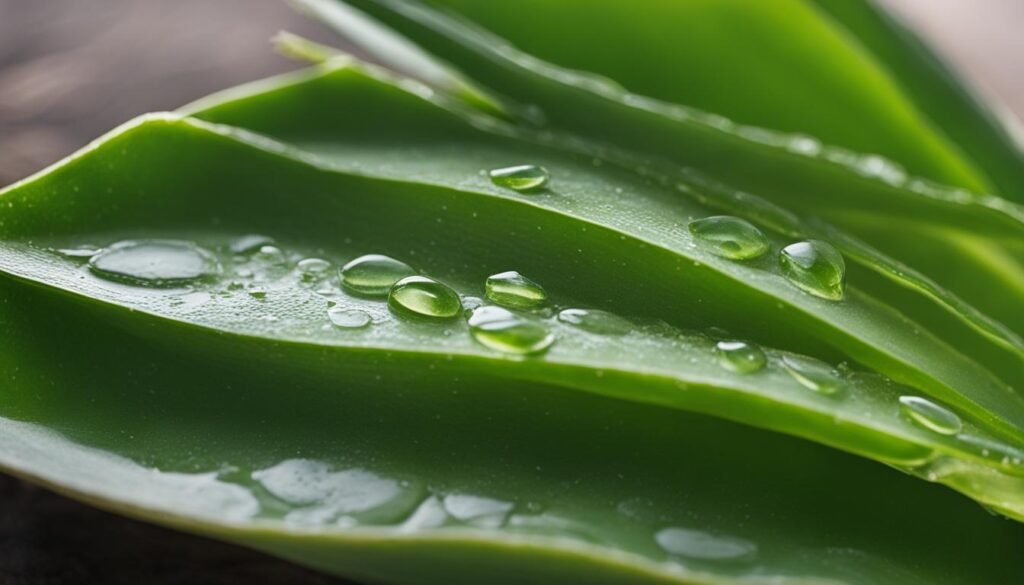
It’s important to note that while aloe vera offers many potential health benefits, it is still recommended to consult with a healthcare professional before using it as a treatment or supplement, especially if you have any pre-existing medical conditions or are taking medications. Aloe vera should be used as a complementary approach to an overall healthy lifestyle and should not replace medical advice or prescribed treatments.
The Benefits of Aloe Vera:
- Enhances nutrient absorption
- Provides anti-inflammatory and antibacterial properties
- Soothes and heals skin conditions
- Supports digestion and boosts the immune system
- Used in a range of alternative remedies and natural health products
Aloe Vera: An Ancient Egyptian Remedy
The ancient Egyptians held a deep reverence for the aloe vera plant, considering it a sacred and powerful remedy. Its role in their beauty routines, embalming practices, and religious ceremonies was of great significance. Aloe vera was commonly used in their daily lives, showcasing its versatility and effectiveness in various aspects of Egyptian culture.
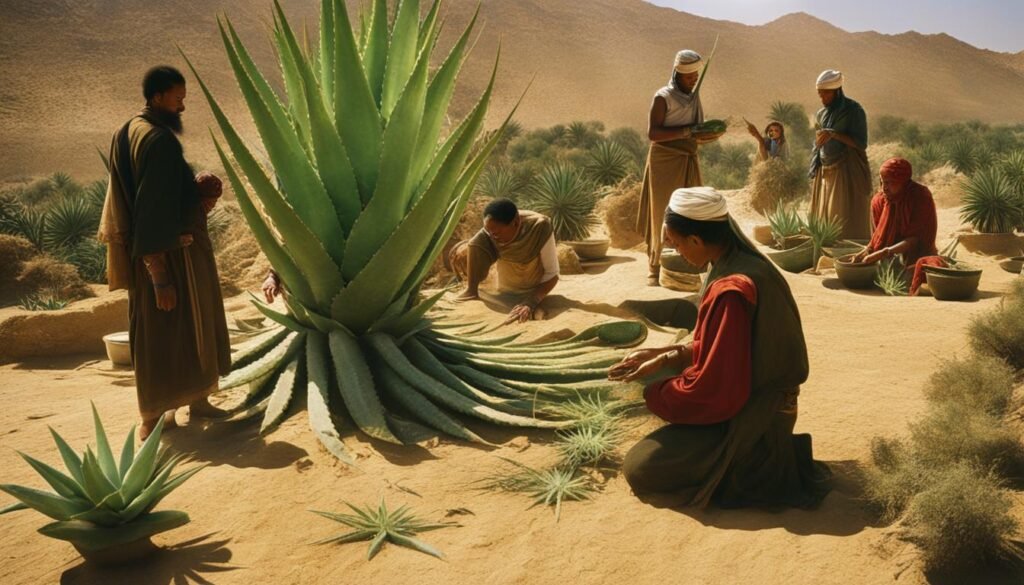
One of the most notable uses of aloe vera in ancient Egypt was in their beauty rituals. Renowned figures like Cleopatra and Nefertiti incorporated aloe vera into their skincare routines, recognizing its ability to nourish and rejuvenate the skin. The gel from the plant was applied to maintain a youthful appearance and protect against the harsh desert environment.
The Egyptians also regarded aloe vera as a religious symbol, using it for protection from evil influences.
Aloe vera also played a crucial role in the embalming process, thanks to its antimicrobial and preservative properties. The gel was used to cleanse and preserve the bodies of the deceased, ensuring their journey into the afterlife. This application of aloe vera demonstrates the Egyptians’ trust in its ability to protect and preserve precious materials.
The importance of aloe vera extended beyond beauty and embalming. The Egyptians believed it had religious significance and used it as a protective charm against evil influences. They sought the plant’s blessings and incorporated it into ceremonies and rituals to ward off negative energies and promote well-being.
Table: Uses of Aloe Vera in Ancient Egypt
| Aspects of Egyptian Culture | Aloe Vera Uses |
|---|---|
| Beauty routines | Skincare, anti-aging, protection from the desert environment |
| Embalming | Preservation of bodies, antimicrobial properties |
| Religious practices | Protection from evil influences, incorporation into rituals |
The ancient Egyptians’ deep-rooted belief in the healing and protective properties of aloe vera is a testament to the plant’s enduring legacy. Its use in beauty routines, embalming practices, and religious ceremonies underscores its multifaceted significance in ancient Egyptian society.
Aloe Vera Throughout History: Ancient Records and Medicinal Uses
In ancient times, aloe vera was highly regarded for its medicinal properties and was extensively used in various cultures. Historical records from ancient Egypt, ancient Mesopotamia, and ancient Rome shed light on the ancient uses of aloe vera for healing and wellness.
In ancient Egypt, aloe vera was considered a valuable plant and was used to treat a variety of ailments. Clay boards from Nippur in Mesopotamia reveal that aloe vera was used as a detoxifier and believed to possess the power to expel evil spirits. In ancient Rome, renowned physicians Dioscorides and Pliny the Elder recommended aloe vera for wounds, gastrointestinal discomfort, skin irritations, and sunburn.
“Aloe vera has been valued for centuries for its healing properties and extensive medicinal uses.”
These ancient records highlight the long-standing recognition of aloe vera’s healing properties and establish its importance in different ancient civilizations. The use and reverence for aloe vera as a medicinal plant have been passed down through generations and continue to be valued in modern times.
Ancient Records: Medicinal Uses of Aloe Vera
Ancient Egypt:
| Condition/Use | Recorded Medicinal Use |
|---|---|
| Inflammation | Treatment for inflammation |
| Pain | Relief from pain |
| Tuberculosis | Used as a remedy for tuberculosis |
Ancient Mesopotamia:
| Condition/Use | Recorded Medicinal Use |
|---|---|
| Detoxification | Used as a detoxifier |
| Expelling evil spirits | Believed to possess the power to expel evil spirits |
Ancient Rome:
| Condition/Use | Recorded Medicinal Use |
|---|---|
| Wounds | Recommended for wound healing |
| Gastrointestinal discomfort | Used for relief from gastrointestinal discomfort |
| Skin irritations | Treatment for skin irritations |
| Sunburn | Used to soothe sunburn |

Aloe Vera in Chinese Culture
In Chinese culture, aloe vera holds great significance and is deeply ingrained in traditional practices. It has been used to treat ailments such as burns, skin irritations, and digestive issues. Aloe vera is also believed to possess cooling and detoxifying properties, making it an essential element in traditional Chinese herbal remedies.
Medicinal Uses of Aloe Vera
Throughout history, aloe vera has been recognized for its versatile medicinal uses. It has been valued for its ability to promote wound healing, soothe skin irritations, and boost the immune system. With its anti-inflammatory and antibacterial properties, aloe vera continues to be a popular choice in modern medicine and natural health products.
| Traditional Uses of Aloe Vera in Chinese Culture | Medicinal Uses of Aloe Vera |
|---|---|
| Used in traditional Chinese medicine to treat burns, skin irritations, and digestive issues | Promotes wound healing |
| Believed to possess cooling and detoxifying properties | Soothes skin irritations |
| Boosts the immune system |
Spanish Monks and Christopher Columbus: Aloe Vera’s Expansion
During the expansion of aloe vera cultivation, Spanish monks played a significant role in spreading the knowledge and cultivation of this remarkable plant. These monks, known for their extensive knowledge of plants and their healing properties, recognized the value of aloe vera and actively promoted its growth in new regions. Their efforts helped establish aloe vera plantations throughout Spain and other parts of Europe, ensuring a steady supply of this medicinal plant.
Christopher Columbus, the renowned explorer, also recognized the healing properties of aloe vera. During his voyages, he carried aloe vera plants on his ships and used the gel to heal wounds suffered by his crew members. This practical application of aloe vera showcased its effectiveness in aiding the healing process and solidified its reputation as a valuable medicinal plant.
As a result of the efforts of Spanish monks and the recognition by explorers like Christopher Columbus, the cultivation of aloe vera expanded rapidly. The demand for this versatile plant grew, leading to an increase in aloe vera plantations and the exploration of its medicinal uses. Aloe vera became a popular ingredient in medicines of the time, further solidifying its importance in the field of natural healing.
The expansion of aloe vera cultivation during this period laid the foundation for the aloe vera industry we see today. The continued recognition of its medicinal uses and the exploration of its therapeutic potential have made aloe vera a sought-after plant in the modern world.

The Medicinal Uses of Aloe Vera
| Medicinal Uses | Benefits |
|---|---|
| Wound Healing | Aloe vera gel promotes the healing of wounds and accelerates the regeneration of damaged skin cells. |
| Anti-inflammatory | Aloe vera has anti-inflammatory properties that can reduce swelling and inflammation in various conditions, such as arthritis and sunburns. |
| Skin Care | Aloe vera is widely used in skincare products due to its moisturizing and soothing properties. It can help alleviate skin conditions like acne and eczema. |
| Digestive Aid | Aloe vera juice can aid in digestion, relieve gastrointestinal issues, and improve nutrient absorption. |
| Immune System Support | Aloe vera contains antioxidants that help boost the immune system and protect the body against harmful free radicals. |
| General Health Benefits | Aloe vera has been associated with various health benefits, including detoxification, improved oral health, and enhanced nutrient absorption. |
Aloe Vera Today: A Popular Remedy and Natural Health Product
Aloe vera remains a popular remedy and natural health product in modern times. Its versatile uses and healing properties have made it a sought-after ingredient in various industries, contributing to the thriving aloe vera industry. From skincare to dietary supplements, aloe vera is widely incorporated into topical lotions, creams, gels, and oral products.
Topical lotions and skincare: Aloe vera has long been recognized for its soothing and moisturizing effects on the skin. Its gel-like consistency helps to hydrate and nourish the skin, making it a common ingredient in moisturizers, sunscreens, and after-sun products. Its anti-inflammatory properties also make it effective in soothing minor skin irritations, such as sunburns and rashes.
Additionally, aloe vera is known for its potential wound-healing properties, which has led to its use in wound care products. Its antimicrobial and anti-inflammatory effects may help promote healing and reduce the risk of infection. This makes aloe vera beneficial for minor cuts, burns, and abrasions.
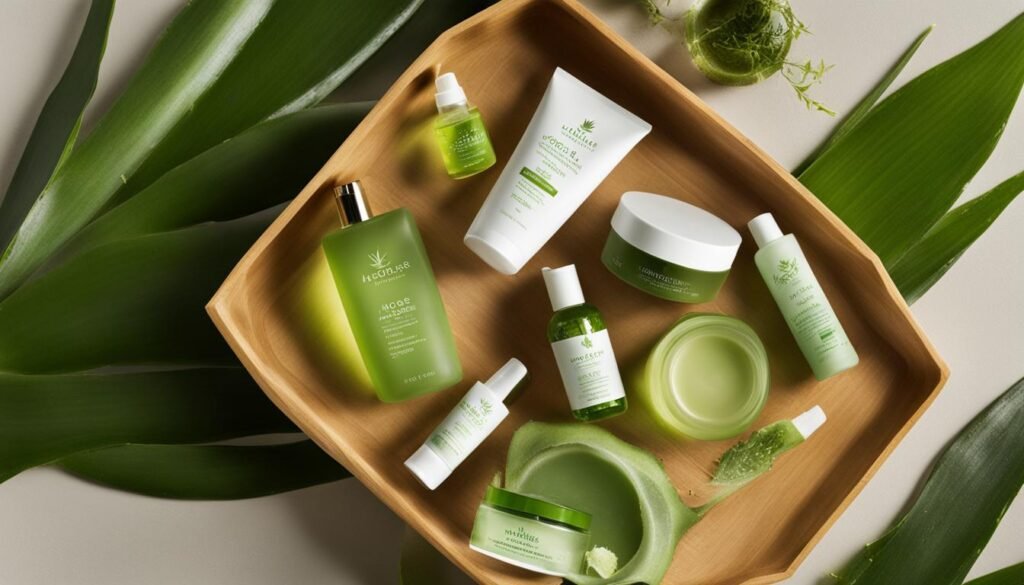
The Aloe Vera Industry
Aloe vera’s medicinal uses and natural health benefits have contributed to the growth of the aloe vera industry. With increasing consumer demand for natural remedies and alternative health products, aloe vera has found its way into the marketplace in various forms. From stand-alone aloe vera products to formulations combined with other botanical extracts, the industry offers a wide range of options for consumers seeking natural alternatives.
Natural health products: Aloe vera is commonly used in dietary supplements and natural health products. It contains a rich array of bioactive compounds, including vitamins, minerals, and antioxidants, which contribute to its potential health benefits. These supplements are often marketed as digestive aids, immune system boosters, and general wellness products.
Alternative remedies: Aloe vera’s healing properties have positioned it as a popular ingredient in alternative remedies. It is used in various traditional systems of medicine, including Ayurveda and Traditional Chinese Medicine (TCM). In these practices, aloe vera is believed to promote balance and support the body’s natural healing processes.
Table: Aloe Vera Products and Their Applications
| Product Type | Applications |
|---|---|
| Skincare | Moisturizers, sunscreens, after-sun products, wound care |
| Dietary Supplements | Digestive aids, immune system support, general wellness |
| Herbal Remedies | Traditional medicine, Ayurveda, Traditional Chinese Medicine |
As the demand for natural and holistic approaches to health and wellness continues to grow, aloe vera remains a popular choice due to its long history of traditional use and potential benefits.
Throughout history, aloe vera has captured the imagination and awe of different cultures. From ancient civilizations to modern times, its healing properties have been revered and utilized. Today, aloe vera stands as a testament to the enduring power of nature in supporting our well-being.
Aloe Vera as the “Elixir of Jerusalem”: Crusades and West Indies
In the time of the Crusades, the Knights Templar created a beverage known as the “Elixir of Jerusalem” that contained aloe vera. This elixir was believed to possess longevity-enhancing properties and played an important role in the lives of the knights. The Knights Templar recognized the medicinal potential of aloe vera and harnessed its healing properties in their pursuit of protecting the Holy Land.
The West Indies also became a significant region for the commercial cultivation of aloe vera during the 18th century. Large quantities of aloe vera were imported for medicinal purposes, highlighting its value as a therapeutic plant. The West Indies provided an ideal environment for the growth of aloe vera, and its cultivation boomed during this period.
To illustrate the historical significance of aloe vera in the Crusades and West Indies, the table below showcases key details about the Knights Templar, aloe vera’s role in the Crusades, and the commercial cultivation of aloe vera in the West Indies.
| Knights Templar | Aloe Vera in the Crusades | Commercial Cultivation of Aloe Vera in the West Indies |
|---|---|---|
| The Knights Templar created the “Elixir of Jerusalem,” a beverage that contained aloe vera. | Aloe vera was used medicinally by the Knights Templar on the battlefield to heal wounds. | The West Indies became an important region for the cultivation of aloe vera. |
| The “Elixir of Jerusalem” was believed to have longevity-enhancing properties. | Aloe vera played a significant role in the Knights Templar’s pursuit of protecting the Holy Land. | The cultivation of aloe vera boomed in the West Indies during the 18th century. |
| The Knights Templar recognized the healing potential of aloe vera. | Aloe vera served as a medicinal resource for the Knights Templar. | Large quantities of aloe vera were imported for medicinal purposes. |
Through their use of the “Elixir of Jerusalem” and the cultivation of aloe vera in the West Indies, the Knights Templar and the West Indies played significant roles in the history of aloe vera.

The Healing Power of Aloe Vera in Native Tribes
Native tribes across different regions have long revered aloe vera for its remarkable healing properties. Within these tribes, aloe vera was considered one of the sacred plants, believed to possess divine qualities. Its medicinal uses were highly valued and passed down through generations, with indigenous people relying on its healing powers for various ailments and injuries.
In addition to its medicinal significance, aloe vera played a crucial role in the preservation of valuable materials within native tribes. The gel extracted from its leaves acted as a natural insect repellent, protecting not only humans but also important belongings such as food stores, clothing, and sacred objects. This preservation property of aloe vera was greatly valued, as it ensured the longevity and well-being of the tribe.
While the specific uses and cultural beliefs surrounding aloe vera varied among different tribes, its role as a holy plant remained consistent. Native tribes recognized the plant’s potent healing properties and relied on its therapeutic benefits for centuries. Aloe vera’s unique ability to heal and protect made it an integral part of their traditional medicine and rituals, connecting them to the ancient wisdom of their ancestors.
| Native Tribes and Aloe Vera | Aloe Vera Uses |
|---|---|
| Hopi Tribe | Used aloe vera gel for healing wounds and treating skin conditions. |
| Navajo Nation | Used aloe vera in medicinal teas and poultices for digestive issues and other ailments. |
| Maasai Tribe | Applied aloe vera gel to soothe sunburns and as a natural moisturizer for dry skin. |
In modern times, the healing power of aloe vera continues to be recognized by indigenous communities and the wider world alike. Its centuries-old legacy as a holy plant and its versatile medicinal properties make aloe vera a symbol of nature’s wisdom and resilience. As we delve deeper into the historical significance and cultural beliefs surrounding aloe vera, we gain a greater appreciation for its profound impact on human well-being throughout the ages.
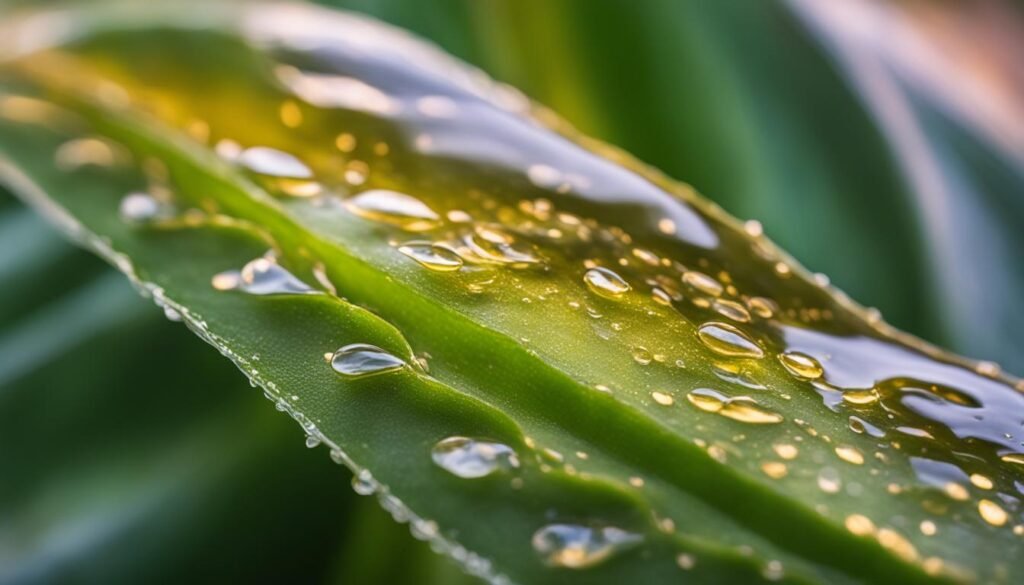
Aloe vera’s anti-inflammatory properties make it an effective remedy for various skin conditions, including burns, cuts, and wounds. It helps to reduce inflammation, relieve pain, and promote the healing process. Aloe vera gel can be applied topically to the affected area, forming a protective barrier that keeps the wound moist and accelerates tissue regeneration. Its antimicrobial properties also prevent infection, ensuring optimal healing.
Furthermore, aloe vera is not limited to topical use. It is also commonly consumed in the form of dietary supplements to promote overall health and well-being. Aloe vera supplements are known to support digestion, boost the immune system, and provide essential nutrients. The bioactive compounds present in aloe vera, such as vitamins, minerals, and polysaccharides, contribute to its beneficial effects on the body.
Scientific Studies on Aloe Vera and Wound Healing
“Numerous scientific studies have demonstrated the effectiveness of aloe vera in wound healing. One study published in the Journal of the American Podiatric Medical Association found that aloe vera gel significantly accelerated the healing of diabetic foot ulcers and reduced the risk of infection.”
Another study published in the International Journal of Molecular Sciences highlighted the anti-inflammatory properties of aloe vera and its ability to stimulate collagen production, further aiding in wound healing. These findings support the traditional use of aloe vera as a natural remedy for wounds and affirm its place in modern medicine.
| Benefits of Aloe Vera in Wound Healing | Scientific Evidence |
|---|---|
| Reduces inflammation | Study published in the International Journal of Molecular Sciences |
| Promotes tissue regeneration | Research studies on diabetic foot ulcers |
| Prevents infection | Various studies on the antimicrobial properties of aloe vera |
In conclusion, aloe vera’s wound healing properties have been validated by scientific studies, confirming its effectiveness as a natural remedy for various skin injuries. Its anti-inflammatory properties, ability to promote tissue regeneration, and antimicrobial effects make it a valuable asset in modern medicine. Whether applied topically or consumed as a dietary supplement, aloe vera continues to be a go-to solution for wound healing and overall well-being.
Aloe Vera: A Hidden Gem in Nature
Aloe vera, with its remarkable healing properties, is truly a hidden gem in nature. This extraordinary plant is packed with bioactive compounds that contribute to its numerous health benefits. From improving nutrient absorption in the body to providing therapeutic effects, aloe vera has become a sought-after ingredient in alternative remedies and natural health products.
The bioactive compounds found in aloe vera, including minerals, enzymes, vitamins, amino acids, and polysaccharides, work synergistically to support overall well-being. These compounds not only enhance nutrient absorption in the body but also provide anti-inflammatory and antibacterial properties. As a result, aloe vera is widely used in topical lotions, skincare products, and dietary supplements.
Table:
| Health Benefits of Aloe Vera | Alternative Remedies |
|---|---|
| 1. Promotes wound healing | 1. Aloe vera gel for burns and skin irritations |
| 2. Supports digestive health | 2. Aloe vera juice for gastrointestinal discomfort |
| 3. Boosts the immune system | 3. Aloe vera supplements for immune support |
| 4. Soothes skin conditions | 4. Aloe vera creams for eczema and psoriasis |
| 5. Provides antioxidant properties | 5. Aloe vera extracts for natural detoxification |
Incorporating aloe vera into daily routines can have significant benefits for overall health and well-being. Whether it’s using aloe vera gel topically to soothe irritated skin or consuming aloe vera supplements to support digestion, this versatile plant offers a range of alternative remedies for various ailments.
By recognizing the hidden gem that is aloe vera and exploring its potential as an alternative remedy, we can tap into nature’s healing power and enhance our overall well-being.
Aloe Folklore: Connecting Past and Present
Aloe vera has a rich history steeped in folklore, connecting the past with the present. This remarkable plant has been cherished for centuries, with diverse cultural beliefs and traditions woven into its story. From ancient civilizations to modern practices, aloe vera has been valued for its medicinal properties and used in traditional medicine and rituals.
In folklore surrounding aloe, different cultures have attributed various magical and healing properties to this plant. For example, ancient Egyptians regarded aloe vera as the “plant of immortality,” incorporating it into beauty routines and using it in the embalming process. Traditional uses of aloe vera also extend to other ancient civilizations such as the Mesopotamians and Romans, who relied on its therapeutic benefits for treating ailments and wounds.
Today, aloe vera continues to captivate the imagination and inspire awe. Its historical significance is evident in the widespread use of aloe vera gel in skincare products and topical lotions. Moreover, aloe vera is a key ingredient in dietary supplements, valued for its potential health benefits. The enduring cultural beliefs and traditional uses of aloe vera highlight its timeless appeal and efficacy as a natural remedy.
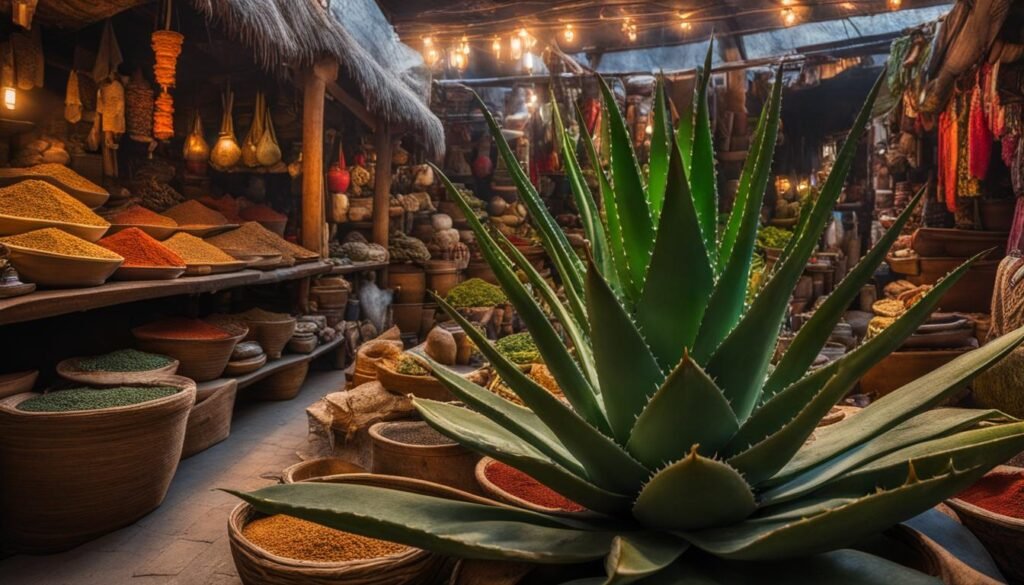
The Historical Significance of Aloe Vera
The historical significance of aloe vera can be seen in its widespread adoption across cultures and time periods. Its enduring presence in ancient healing practices and its continued relevance in modern medicine speak to its remarkable qualities. The diverse folklore surrounding aloe vera serves as a testament to its value and the reverence it has garnered over the centuries.
Conclusion
Throughout history, aloe vera has been revered for its ancient healing properties and continues to be valued in modern times. This remarkable plant, with its rich folklore and traditions, has stood the test of time as a natural remedy. From ancient civilizations like the Egyptians and Mesopotamians to the present day, aloe vera has been recognized for its medicinal properties.
With its bioactive compounds and nutrient-absorbing abilities, aloe vera has proven to be a versatile plant with various therapeutic effects. Its healing properties have been harnessed for skincare products, dietary supplements, and alternative remedies. Whether it’s treating wounds, promoting wellness, or enhancing beauty, aloe vera remains a valuable resource.
Ancient healing practices have paved the way for our understanding of aloe vera’s potential in modern medicine. Scientific studies continue to showcase the anti-inflammatory and antibacterial properties of aloe vera, reaffirming its significance. As we connect the past with the present through aloe folklore, we recognize the enduring legacy of this plant as an ancient healer.
Indeed, aloe vera’s reputation as an ancient remedy with modern applications is well-deserved. It continues to be a symbol of healing and a testament to the power of nature. The remarkable journey through aloe folklore reminds us of the significance of this plant and its enduring role in our health and well-being.
FAQ
What are the traditional uses of aloe vera?
Aloe vera has been used for centuries for its medicinal properties and is known for its various traditional uses, including treating burns, promoting wound healing, aiding digestion, and boosting the immune system.
Is aloe vera a cactus?
No, aloe vera belongs to the Lily family, not the cactus family. It is characterized by its thick, spiny leaves that grow in a rosette pattern and produce yellow flowers.
What are the bioactive compounds in aloe vera?
Aloe vera contains minerals, enzymes, vitamins, amino acids, and polysaccharides, which contribute to its health benefits. These compounds enhance nutrient absorption in the body and provide anti-inflammatory and antibacterial properties.
How is aloe vera used in modern medicine?
Aloe vera is widely used in topical lotions and skincare products for its wound-healing and anti-inflammatory properties. It is also incorporated into dietary supplements for various health benefits.
What is the historical significance of aloe vera?
Aloe vera has a rich history and folklore surrounding it. Ancient civilizations, such as the ancient Egyptians and Mesopotamians, believed in its healing power and valued it as a potent remedy. It has been used for beauty routines, embalming, and protection from evil influences.
Where did aloe vera originate?
Aloe vera is believed to have originated in the Arabian Peninsula and spread to different regions through trade and exploration. It has played a significant role in various cultures, including ancient Egypt, China, and medieval Europe.
What are the health benefits of aloe vera?
Aloe vera has numerous health benefits due to its bioactive compounds. It can improve nutrient absorption, provide anti-inflammatory and antibacterial properties, aid in digestion, promote wound healing, and support the immune system.
How can aloe vera be used as a natural health product?
Aloe vera is widely used in alternative remedies and natural health products. It can be found in skincare products, topical lotions, and dietary supplements, offering various therapeutic effects and promoting overall well-being.
Is aloe vera still used in traditional medicine?
Yes, aloe vera continues to be valued in traditional medicine for its diverse properties. It is used in different cultures and regions for its medicinal benefits, ranging from treating burns and skin conditions to alleviating gastrointestinal discomfort.
Can aloe vera be used to treat wounds?
Yes, aloe vera has been scientifically proven to have wound-healing properties. Its anti-inflammatory and antibacterial effects contribute to the healing process and can promote faster recovery.
